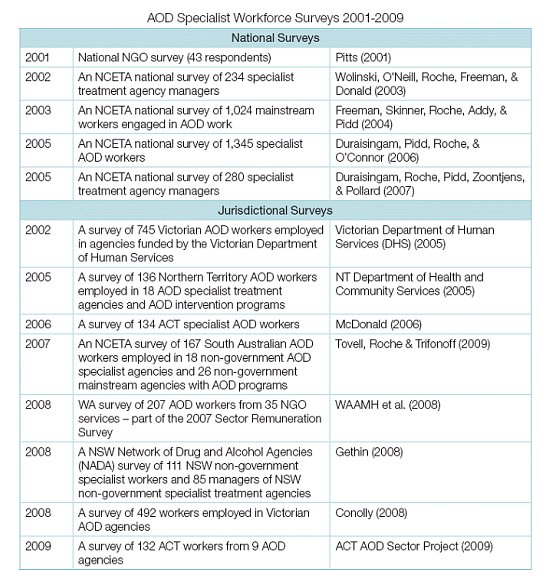AOD Specialist Workers
Alcohol and other drug (AOD) specialist workers include workers whose main work role is to deal with specific AOD issues within a specific AOD service. This includes workers employed in:
- specialist treatment agencies or organisations that provide other AOD services such as education, prevention, or assessment and referral
- AOD programs that are embedded within other (non-AOD specialist) organisations (e.g., workers providing AOD treatment, counselling or AOD prevention and education within a hospital or community health organisation).
A diverse range of occupations make up the AOD specialist workforce including:
- Generic AOD workers
- Psychologists
- Counsellors
- Social workers
- Doctors
- Indigenous workers
- Allied health workers
- Nurses
- Pharmacists
- Psychiatrists
- Peer workers
- Project workers
- Education officers/trainers
- Managers/admin officer
Workforce Surveys
Over the past decade, a number of national and jurisdictional AOD workforce surveys have been undertaken. Viewed collectively, these surveys provide a composite profile of the AOD workforce.
The largest occupational groups are generalist AOD workers and nurses, however, the proportions of generalist workers and nurses vary greatly between government and non-government organisations. A substantially larger proportion of nurses work in government organisations. This may reflect differences in service delivery models.
The AOD specialist workforce undertakes a range of activities in a variety of organisations (government, non-government, and private). Nationally, the proportion of government and non-government AOD organisations is approximately 50:50, however, there are substantial variations across jurisdictions.
Key features of the AOD specialist workforce include the following:
- the majority are female
- nearly half are aged 45 years or older
- between 30% and 54% are employed part-time
- average duration of working in the AOD field is approximately 5 years.
More Information
Further information on the AOD specialist workforce can be found in the following:
NCETA national workforce survey reports
- Taking First Steps: What Family-Sensitive Practice Means for Alcohol and other drug Workers. A Survey Report (2010) [pdf, 1,209 KB]
- Wellbeing, Stress & Burnout: A national survey of Managers in alcohol and other drug treatment services (2007) [pdf, 1.95MB]
- Satisfaction, Stress & Retention among Alcohol & Other Drug Workers in Australia (2006) [pdf, 2.89MB]
- Workforce issues and the treatment of alcohol problems: A survey of managers of alcohol and drug treatment agencies (2003) [pdf, 1.06MB]
Jurisdictional workforce survey reports
- A profile of the Australian Capital Territory alcohol and other drugs workforce (2009) [pdf, 615KB]
- A profile of the Victorian AOD workforce (2008) [pdf, 1.2MB]
- NSW alcohol and other drug non-government sector: Workforce profile and issues (2008) [pdf, 1.73MB]
- Workforce in crisis: A report on remuneration, retention and recruitment challenges facing the nongovernment Alcohol and Other Drugs (AOD), Family and Domestic Violence (FDV), Mental Health (MH) and Women's Health (WH) sectors in Western Australia (2008) [pdf, 459 KB]
- A profile of workers in South Australian alcohol and other drugs non-government organisations (2007) [pdf, 1.28Mb]
NCETA peer reviewed workforce publications
- Duraisingam, V., K. Pidd, et al. (2009). "The impact of work stress and job satisfaction on turnover intentions: A study of Australian specialist alcohol and other drug workers." Drugs: Education, prevention and policy 16(3): 217-231 [website].
- Duraisingam, V., K. Pidd, et al. (2007). A national study of managers' wellbeing in the alcohol and other drugs (AOD) field, Proceedings of the 7th Industrial & Organisational Psychology Conference, Adelaide, 28 June-1 July 2007, p88.
- Roche, A. M., O'Neill, M., & Wolinski, K. (2004). Alcohol and other drugs specialist treatment services and their managers: Findings from a national survey. Australian and New Zealand Journal of Public Health, 28(3), 252-258 [website]
